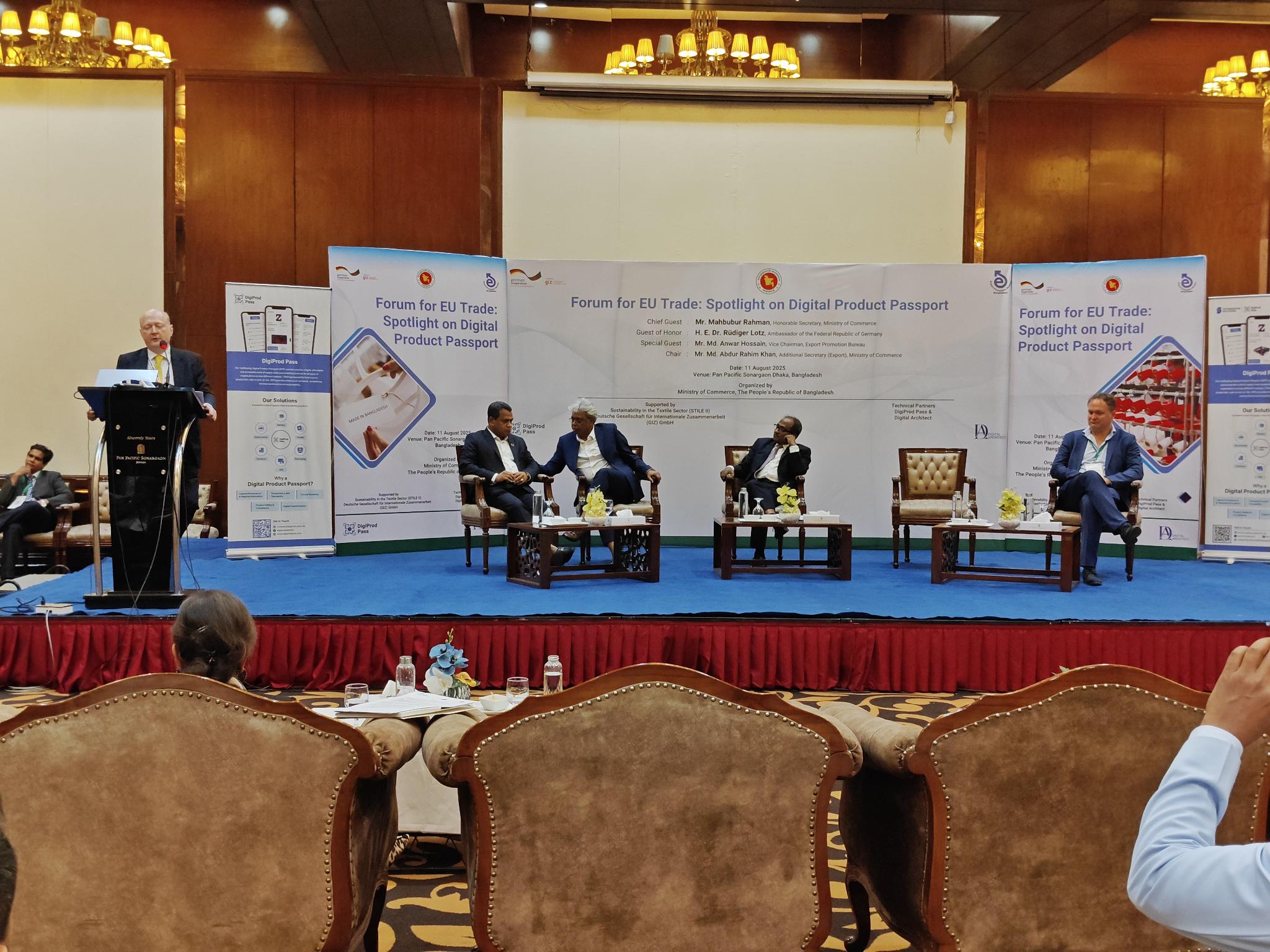The Ministry of Commerce of Bangladesh organized a daylong seminar titled “Forum for EU Trade: Spotlight on Digital Product Passport“ at the Pan Pacific Sonargaon Dhaka. The event was held to discuss the European Union’s new sustainability regulations, specifically the Digital Product Passport (DPP), and its impact on Bangladesh’s export industries. The seminar was supported by Deutsche Gesellschaft für Internationale Zusammenarbeit (GIZ) GmbH, with DigiProd Pass Ltd. and Digital Architect Ltd. as technical partners.
The forum aimed to provide clarity on one of the core elements of the EU’s Ecodesign for Sustainable Products Regulation (ESPR). The regulation, which will be phased in between 2027 and 2030, mandates the use of DPPs, digital “identity cards” for products sold within the EU. These DPPs contain vital information about a product’s model, batch, materials, repairs, and recycling potential. With traceability and circularity at the heart of the regulation, the forum sought to examine how Bangladesh can adapt its trade practices to align with these new requirements.
Aligning with EU Regulations
The DPP initiative is designed to improve sustainability by creating digital records of a product’s components and lifecycle. These records can enhance the traceability of materials, reuse, and recycling in supply chains. Unlike ESG (Environmental, Social, and Governance) data, which companies typically collect for financial or shareholder purposes, DPP data is meant for regulatory compliance, transparency, and sustainability in the EU market.
Under the ESPR, which took effect in July 2024, industries such as textiles, electronics, and batteries will be the first to comply with DPP standards, with a full rollout expected by mid-2026. The DPP register will be operational, and by 2027, compliance will be mandatory for affected products, with sector-specific rules to follow.
Insightful Discussions from Experts
The seminar featured speeches from key figures, including Mahbubur Rahman, Honourable Secretary of the Ministry of Commerce, and H.E. Dr. Rüdiger Lotz, Ambassador of the Federal Republic of Germany. MD. Abdur Rahim Khan, Additional Secretary (Export) of the Ministry of Commerce, chaired the event.
One of the main points raised during the forum was how Bangladesh’s export sector is preparing for these upcoming changes. Md. Anwar Hossain, Vice-Chairman of the Export Promotion Bureau (EPB), emphasized the importance of collaboration between the private sector, industry associations, and the government:
Collaborative efforts are crucial moving forward. While the government plays a facilitating role, the private sector and associations like BGMEA and BKMEA are essential in making these changes happen.
Md. Anwar Hossain, Vice-Chairman of the Export Promotion Bureau (EPB)
Vidiya Amrit Khan, Vice President of BGMEA, highlighted the challenges faced by smaller manufacturers in the face of these new regulations:
Many larger factories are already adopting the DPP, but the situation for small and medium-sized enterprises (SMEs) is quite different. Many of these factories have had to shut down, and those that remain struggle to meet the new standards. We need support from both the EU and our government to ensure these factories can stay competitive.
Vidiya Amrit Khan, Vice President of BGMEA
Panel Discussions and Technical Insights
The event included two panel discussions. The first panel, “From Regulation to Readiness,” explored Bangladesh’s preparedness for the new EU traceability requirements. Representatives from the Ministry of Commerce, BIDA, BGMEA, BKMEA, and the Export Promotion Bureau participated in this discussion.
The second panel, “Implementation Insights and Challenges,” offered field-level perspectives. Organizations such as Reverse Resources, Urmi Group, DataDevelop Consulting, DigiProd Pass and SERA Bangladesh shared their experiences in navigating these challenges.
A technical session further elaborated on the structure of the DPP under the ESPR. The session featured examples from the digital battery passport initiative, demonstrating how these systems are already being applied globally.
The forum concluded with a technology showcase, where companies like DigiProd Pass, Garmenttech, Reverse Resources, ProKnoWara, and Leathertrace displayed their digital traceability solutions.
This seminar was a crucial step in helping Bangladesh’s export industries prepare for the evolving EU sustainability standards. As the global demand for sustainable and traceable products grows, aligning with these standards will ensure long-term competitiveness and regulatory compliance for Bangladesh’s export sector.
